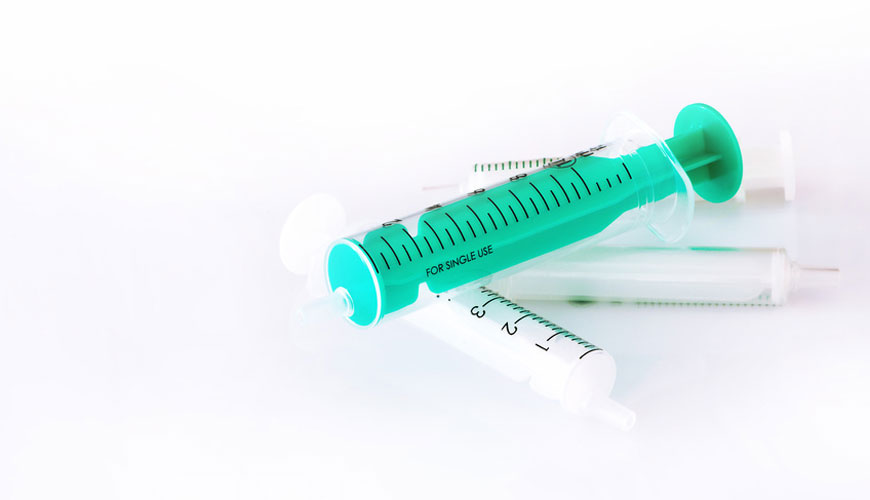

EUROLAB laboratory provides testing and compliance services within the scope of ISO 11040-4 standard. This part of the ISO 11040 standard, developed by the International Organization for Standardization (ISO), applies to tubular glass barrels (single chamber design) and sterilized bottom-coupled syringes for injection preparations.

It specifies materials, dimensions, quality and performance requirements as well as relevant test methods. This part of ISO 11040 also specifies components that are a ready-to-fill part of the sterilized lower-assembled syringe.
In the past, ampoules and injection vials were used primarily for (parenteral) injectable products. However, for the injection of the products contained in these ampoules and vials, a hypodermic syringe combined with the appropriate injection needle is also required. This means that the injectable product must be transferred by the user into the hypodermic syringe before final use. This procedure is not only time consuming but also offers numerous possibilities for contamination.
To ensure the safe use of an injectable product, disposable prefilled syringes have been on the market for many years. Undoubtedly, such prefilled syringes allow immediate injection of the contained product after relatively simple use. These syringes can also be used in injectors with automatic functions where more and special requirements apply.
Depending on the diameter of the prefilled syringes, suitable components such as rubber plungers, end caps, needle guards and other closure systems can also be standardized. Together with the right sealing components, they offer a system for (parenteral) injectable use. Filling machine manufacturers can apply this part of ISO 11040 to achieve some degree of standardization in the equipment of the machines.
At the beginning of prefilled syringe processing by the pharmaceutical industry, syringes made of tubular glass were delivered to pharmaceutical companies only as non-sterile "bulk goods". Later, the steps of washing, drying, internal lubrication, sealing the syringe with a closing system, sterilization, as well as filling and capping were carried out in pharmaceutical companies. This is how the processing of bulk goods is carried out to this day. Sterilized bottom-assembled syringes have partially replaced non-sterile "bulk articles".
In the case of sterilized bottom-assembled syringes ready to be filled, the responsibility for the above-mentioned processing steps for the injectable product lies with the manufacturer of the primary packaging material. Following the assembly of the needle guard for syringes with needles or syringes with end caps for the Luer cone version, the bottom-mounted syringes are inserted into so-called slots.
The nests, in turn, are placed in a plastic tub. The syringes in the housing are protected by a snap liner, and the cuvette itself is closed with a sealing cap (this has now and until now been achieved mainly using a porous material). Therefore, the cuvette, properly closed with a sealed lid, represents the “sterile barrier system”. The sealed cuvette is then wrapped in a sealable bag so it is ready for sterilization now and thus far.
In this form, sterilized sub-assembled syringes are delivered to pharmaceutical companies to be processed in suitable machines, ready to be filled, sterile.
Ready-to-fill glass vats and sterilized bottom-mount syringes in accordance with this part of ISO 11040 are intended for single use only. Components to complete the sub-assembled syringe, such as the plunger and rod, are not specified in this part of ISO 11040.
Among the services provided by our organization within the framework of material testing services, there are also ISO 11040-4 standard tests. Do not hesitate to contact our laboratory EUROLAB for your testing and certification requests.
To get an appointment, to get more detailed information or to request an evaluation, you can ask us to fill in our form and reach you.